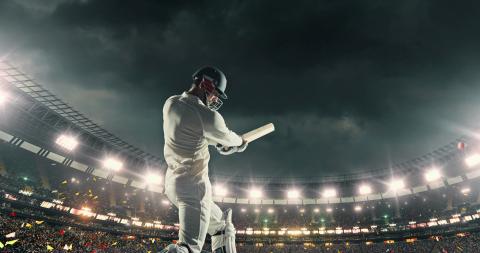
by Benjamin Rainbird
Technology: The Next Big Test for Cricket was an enlightening debate featuring current Test batsman Usman Khawaja, custodian of the Duckworth-Lewis-Stern system Steve Stern, and international umpire Bruce Oxenford.
The debate featured a discussion on the implementation of the Duckworth-Lewis-Stern system, the role of the Decision Review System (DRS) in umpiring and the future of human umpires within the sport.
Stern's explanation of the Duckworth-Lewis-Stern system provided an opportunity to consider the mathematics behind cricket. For those unfamiliar with the rules of cricket, the Duckworth-Lewis-Stern system is implemented in limited-overs cricket when rain reduces play. This aspect of the game is one I have rarely considered, and despite playing cricket all my life is still an area I have never understood. Hearing Stern's explanation of factors influencing run rates highlighted cricket's complexity and demonstrated the importance of data analytics in sports.
The insights provided by Khawaja and Oxenford challenged my perspectives regarding how elite sports utilise technology. They offered insight into the strategies used by the Australian Cricket team regarding technology usage, such as DRS usage during wicket reviews. The pair also shed light on team dynamics, with the main takeaway being don’t trust Marnus Labuschagne with a review.
Oxenford also discussed technology's importance in making decisions that umpires are unsure about. He explained how the implementation of DRS was positive for umpires, taking the stress out of decision-making and, overall, getting the correct result more often. Khawaja reinforced this idea, revealing that players prefer DRS and, by extension, more technology because the right decision gets made more often, improving cricket for everyone.
After discussing these points, the panel fielded questions from the crowd. Afterwards, we swarmed the panellists, getting photos and picking their minds with some one-on-one conversations before the night concluded.
At the end of the evening, I was left reflecting on what the panel had discussed. The debate made me reconsider the use of technology in sports. Whether it's the implementation of new technologies or social media's impact on players, technology is ever-changing, and therefore its role needs to be continuously re-evaluated. I was also left with a renewed appreciation of elite athletes' work and, equally as importantly, the work that goes on behind the scenes and away from the media's primary focus.
Benjamin Rainbird, 19, is a second-year Bond University medical student and Brisbane grade cricketer.